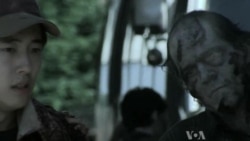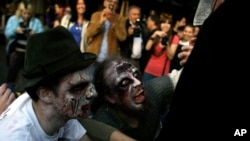You can learn a lot from a zombie.
Just ask zombie expert David Castillo, literature professor at the University at Buffalo.
“They reveal who fundamentally we fear we are, and they also warn us about the collective choices we’re making,” Castillo said.
That's a lot of heavy subtext to lay on the mindless undead. But Castillo believes it can help explain the current obsession with the zombie apocalypse.
Undead hordes have been sighted shambling through streets from Serbia to Singapore in organized zombie walks and runs. “World War Z” has grossed more than half a billion dollars in movie theaters globally. And the hit TV show “The Walking Dead” is in its fourth season.
Something is going on here. Could it be that we see a bit of our future in the zombie apocalypse?
But first, a little zombie history.
“[Zombie] is originally a Congolese word,” explained George Mason University anthropologist Jeffrey Mantz. He says it crossed the Atlantic with African slaves, and “it made its way into the religious practices of various Caribbean communities, most notably in Haiti.”
Zombies came to Hollywood with the U.S. occupation of Haiti from 1915 to 1934. The first zombie movie, “White Zombie,” starring vampire legend Bela Lugosi, hit the silver screen in 1932.
You call that a zombie?
But Haitian zombies might not recognize their American heirs.
For one thing, Haitian zombies don’t have to be dead.
“Haitian zombies are about the relationship between master and slave,” Mantz said, reflecting the island’s sugar-plantation history. “Someone’s body can be detached from its soul, and that body can be turned into a servant for someone who’s not up to any good.”
Mantz says the undead zombie superimposes a Western concept about honoring deceased relatives.
“In northern European traditions, if you didn’t visit the gravesite, they could come back and get you. They’re called revenants.”
The zombie oeuvre
Castillo says the modern cannibal zombie traces its roots to 1968's “Night of the Living Dead.”
That movie was made during a turbulent time in American history, Mantz notes. “There’s all sorts of social transformations taking place. It’s the height of the nuclear age, with tensions with the Soviet Union.”
You can attach any number of metaphors to the zombies, he says. But what really stands out is not the zombie attack, but how the living respond.
“The two main characters bicker constantly throughout the movie and can’t seem to cooperate on anything. And their lack of cooperation is their own undoing.”
It’s a common thread in the zombie oeuvre, he adds: “This isn’t really about zombies, per se. This is about humans.”
“The Walking Dead” is as much about relations among the living as it is about fighting the undead.
Digital zombies
And “28 Days Later” asks who you can trust when the world comes to an end.
That 2002 movie broke the mold of the slow, shuffling undead. These were zombies for the digital age, fast as the Internet.
Zombies resonate with us because they represent something we fear is stealing our humanity, and today, Mantz says, “a lot of the technological transformations that are taking place are turning us into zombies, quite literally.”
It used to be television that turned us into zombies, he notes. “Now video games do it. Now we’re staring into our smartphones. Stand around long enough and you can watch two human beings walk into each other, both with their faces buried into their smartphones.”
He’s only half-joking. There is something dehumanizing about our ubiquitous technology, he says.
And it’s sadly ironic, he adds, that the minerals making much of that technology possible come from the Congo -- the same place as the word “zombie," and a place where inhuman atrocities are far too common.
End times
But the question remains: why are we obsessed with the zombie apocalypse now more than ever? David Castillo says it reflects something deep in our psyche.
“Really, there is a general perception of crisis. More and more we suspect we are living at the very edge. We’re living in the end of times.”
Global warming, disease, terrorism, political dysfunction and economic calamities… Castillo says there’s a sense that maybe the world actually is coming to an end, in a way.
“Our default belief now is that the apocalypse is near. And we don’t seem to be able to stop it. The zombies, in a way, exemplify that. They are that warning.”
And maybe visions of the zombie apocalypse can teach us to get along…before it’s too late.
Just ask zombie expert David Castillo, literature professor at the University at Buffalo.
“They reveal who fundamentally we fear we are, and they also warn us about the collective choices we’re making,” Castillo said.
That's a lot of heavy subtext to lay on the mindless undead. But Castillo believes it can help explain the current obsession with the zombie apocalypse.
Undead hordes have been sighted shambling through streets from Serbia to Singapore in organized zombie walks and runs. “World War Z” has grossed more than half a billion dollars in movie theaters globally. And the hit TV show “The Walking Dead” is in its fourth season.
Something is going on here. Could it be that we see a bit of our future in the zombie apocalypse?
But first, a little zombie history.
“[Zombie] is originally a Congolese word,” explained George Mason University anthropologist Jeffrey Mantz. He says it crossed the Atlantic with African slaves, and “it made its way into the religious practices of various Caribbean communities, most notably in Haiti.”
Zombies came to Hollywood with the U.S. occupation of Haiti from 1915 to 1934. The first zombie movie, “White Zombie,” starring vampire legend Bela Lugosi, hit the silver screen in 1932.
You call that a zombie?
But Haitian zombies might not recognize their American heirs.
For one thing, Haitian zombies don’t have to be dead.
“Haitian zombies are about the relationship between master and slave,” Mantz said, reflecting the island’s sugar-plantation history. “Someone’s body can be detached from its soul, and that body can be turned into a servant for someone who’s not up to any good.”
Mantz says the undead zombie superimposes a Western concept about honoring deceased relatives.
“In northern European traditions, if you didn’t visit the gravesite, they could come back and get you. They’re called revenants.”
The zombie oeuvre
Castillo says the modern cannibal zombie traces its roots to 1968's “Night of the Living Dead.”
That movie was made during a turbulent time in American history, Mantz notes. “There’s all sorts of social transformations taking place. It’s the height of the nuclear age, with tensions with the Soviet Union.”
You can attach any number of metaphors to the zombies, he says. But what really stands out is not the zombie attack, but how the living respond.
“The two main characters bicker constantly throughout the movie and can’t seem to cooperate on anything. And their lack of cooperation is their own undoing.”
It’s a common thread in the zombie oeuvre, he adds: “This isn’t really about zombies, per se. This is about humans.”
“The Walking Dead” is as much about relations among the living as it is about fighting the undead.
Digital zombies
And “28 Days Later” asks who you can trust when the world comes to an end.
That 2002 movie broke the mold of the slow, shuffling undead. These were zombies for the digital age, fast as the Internet.
Zombies resonate with us because they represent something we fear is stealing our humanity, and today, Mantz says, “a lot of the technological transformations that are taking place are turning us into zombies, quite literally.”
It used to be television that turned us into zombies, he notes. “Now video games do it. Now we’re staring into our smartphones. Stand around long enough and you can watch two human beings walk into each other, both with their faces buried into their smartphones.”
He’s only half-joking. There is something dehumanizing about our ubiquitous technology, he says.
And it’s sadly ironic, he adds, that the minerals making much of that technology possible come from the Congo -- the same place as the word “zombie," and a place where inhuman atrocities are far too common.
End times
But the question remains: why are we obsessed with the zombie apocalypse now more than ever? David Castillo says it reflects something deep in our psyche.
“Really, there is a general perception of crisis. More and more we suspect we are living at the very edge. We’re living in the end of times.”
Global warming, disease, terrorism, political dysfunction and economic calamities… Castillo says there’s a sense that maybe the world actually is coming to an end, in a way.
“Our default belief now is that the apocalypse is near. And we don’t seem to be able to stop it. The zombies, in a way, exemplify that. They are that warning.”
And maybe visions of the zombie apocalypse can teach us to get along…before it’s too late.






